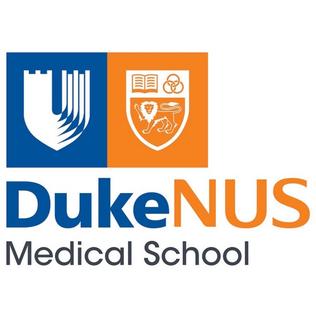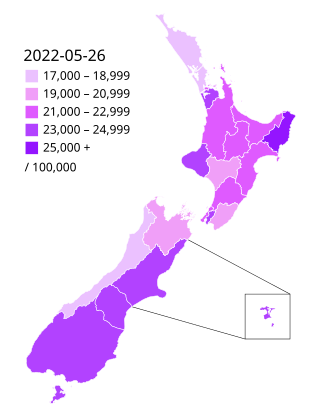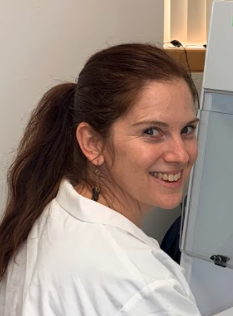Related Research Articles
Bronchoalveolar lavage (BAL) is a diagnostic method of the lower respiratory system in which a bronchoscope is passed through the mouth or nose into an appropriate airway in the lungs, with a measured amount of fluid introduced and then collected for examination. This method is typically performed to diagnose pathogenic infections of the lower respiratory airways, though it also has been shown to have utility in diagnosing interstitial lung disease. Bronchoalveolar lavage can be a more sensitive method of detection than nasal swabs in respiratory molecular diagnostics, as has been the case with SARS-CoV-2 where bronchoalveolar lavage samples detect copies of viral RNA after negative nasal swab testing.

Yuen Kwok-yung is a Hong Kong microbiologist, physician and surgeon. He is a prolific researcher, with most of his nearly 800 papers related to research on novel microbes or emerging infectious diseases. He led a team identifying the SARS coronavirus that caused the SARS pandemic of 2003–4, and traced its genetic origins to wild bats. During the ongoing COVID-19 pandemic, he has acted as expert adviser to the Hong Kong government.
Point-of-care testing (POCT), also called near-patient testing or bedside testing, is defined as medical diagnostic testing at or near the point of care—that is, at the time and place of patient care. This contrasts with the historical pattern in which testing was wholly or mostly confined to the medical laboratory, which entailed sending off specimens away from the point of care and then waiting hours or days to learn the results, during which time care must continue without the desired information.

The Duke–NUS Medical School (Duke–NUS) is a graduate medical school in Singapore. The school was set up in April 2005 as the Duke–NUS Graduate Medical School, Singapore's second medical school, after the Yong Loo Lin School of Medicine, and before the Lee Kong Chian School of Medicine. It is a collaboration between Duke University in the United States and the National University of Singapore in Singapore. Duke-NUS follows the American model of post-baccalaureate medical education, in which students begin their medical studies after earning a bachelor's degree. Students are awarded degrees from both Duke University and the National University of Singapore.

Mel Krajden is a physician and professor of Pathology and Laboratory Medicine at the University of British Columbia in Vancouver, British Columbia, Canada. He is the medical director of the BCCDC Public Health Laboratory. Dr. Krajden obtained his BSc, MD, and FRCPC at McGill University, followed by a fellowship in Infectious Diseases at Stanford University. He is also the medical director of the Public Health Laboratory at the British Columbia Centre for Disease Control. His research focuses on the prevention and care of hepatitis, human papillomavirus, and human immunodeficiency virus.

DiaSorin is an Italian multinational biotechnology company that produces and markets in vitro diagnostics reagent kits used in immunodiagnostics and molecular diagnostics and since July 2021, it is also active in the Life Science business. The group was founded in 2000 and is headquartered in Saluggia, Italy. Its production is at several plants located in Europe and the United States: Saluggia and Gerenzano (Italy), Dietzenbach (Germany), Stillwater, Minnesota (US), Dartford (UK). Following the acquisition of Luminex, the company acquired five additional production plants located in the United States and in Canada (Toronto). The company is a constituent of the FTSE MIB index.

COVID-19 testing involves analyzing samples to assess the current or past presence of SARS-CoV-2. The two main types of tests detect either the presence of the virus or antibodies produced in response to infection. Molecular tests for viral presence through its molecular components are used to diagnose individual cases and to allow public health authorities to trace and contain outbreaks. Antibody tests instead show whether someone once had the disease. They are less useful for diagnosing current infections because antibodies may not develop for weeks after infection. It is used to assess disease prevalence, which aids the estimation of the infection fatality rate.

The COVID-19 pandemic in New Zealand was part of the pandemic of coronavirus disease 2019 caused by severe acute respiratory syndrome coronavirus 2. The first case of the disease in New Zealand was reported on 28 February 2020. The country recorded over 2,274,370 cases. Over 3,000 people died as a result of the pandemic, with cases recorded in all twenty district health board (DHB) areas. The pandemic first peaked in early April 2020, with 89 new cases recorded per day and 929 active cases. Cases peaked again in October 2021 with 134 new cases reported on 22 October.

The COVID-19 pandemic in Turkey is part of the ongoing pandemic of coronavirus disease 2019 caused by severe acute respiratory syndrome coronavirus 2.

The COVID-19 pandemic in Samoa is part of the ongoing worldwide pandemic of coronavirus disease 2019 caused by severe acute respiratory syndrome coronavirus 2. The virus was confirmed to have reached Samoa on 18 November 2020. The country reported its second case on 27 November.
Allison Joan McGeer is a Canadian infectious disease specialist in the Sinai Health System, and a professor in the Department of Laboratory Medicine and Pathobiology at the University of Toronto. She also appointed at the Dalla Lana School of Public Health and a Senior Clinician Scientist at the Lunenfeld-Tanenbaum Research Institute, and is a partner of the National Collaborating Centre for Infectious Diseases. McGeer has led investigations into the severe acute respiratory syndrome outbreak in Toronto and worked alongside Donald Low. During the COVID-19 pandemic, McGeer has studied how SARS-CoV-2 survives in the air and has served on several provincial committees advising aspects of the Government of Ontario's pandemic response.

The COVID-19 pandemic in the Cook Islands is part of the ongoing worldwide pandemic of coronavirus disease 2019 caused by severe acute respiratory syndrome coronavirus 2. As of 30 October 2021, 12,841 first doses and 12,498 second doses of vaccine had been administered, which represents over 97% of the eligible population (12+) fully vaccinated.

A coronavirus breathalyzer is a diagnostic medical device enabling the user to test with 90% or greater accuracy the presence of severe acute respiratory syndrome coronavirus 2 in an exhaled breath. As of the first half of 2020, the idea of a practical coronavirus breathalyzer was concomitantly developed by unrelated research groups in Australia, Canada, Finland, Germany, Indonesia, Israel, Netherlands, Poland, Singapore, United Kingdom and USA.
Operation Moonshot was a UK government programme to introduce same-day mass testing for COVID-19 in England as a way of enabling large gatherings of people to take place in that country while maintaining control over the virus. According to the British Medical Journal, the programme aimed to deliver 10 million tests per day by 2021.
A four-tier alert level restrictions system was in place in during the COVID-19 pandemic in New Zealand between March 2020 and December 2021, with levels 3 and 4 being forms of lockdown. In level 1 there were no restrictions; in level 2 there were limits on gatherings; in level 3 only purposeful travel was allowed and there were strict limits on gatherings; and in level 4 only essential travel was allowed and gatherings were banned.
Curative Inc. is a health care startup company best known for scaling COVID-19 testing and COVID-19 vaccinations during the COVID-19 pandemic. In September 2022, Curative Inc. launched Curative Insurance Company, a new health insurance plan featuring no copays and no deductibles. Headquartered in Austin, Texas, with employees throughout the United States, the company was founded in January 2020 by Fred Turner, Isaac Turner, and Vlad Slepnev to create new diagnostic tests for sepsis and to improve outcomes for sepsis patients. In response to an urgent, unmet need for COVID-19 test development and production in the United States, Curative rapidly shifted focus in March 2020. The company's research team developed a new test for SARS-CoV-2 that utilized oral swabs rather than nasopharyngeal swabs. The Curative test was designed with a scalable process and opportunities to reduce healthcare worker exposure risk, and therefore the amount of personal protective equipment (PPE) used. An independent manufacturing and supply chain model was adopted to avoid competing with existing COVID-19 test companies for limited supplies and laboratory capacity.

COVID-19 rapid antigen tests or RATs, also frequently called COVID-19 lateral flow tests or LFTs, are rapid antigen tests used to detect SARS-CoV-2 infection (COVID-19). They are quick to implement with minimal training, cost a fraction of other forms of COVID-19 testing, and give users a result within 5–30 minutes. RATs have been used in several countries as part of mass testing or population-wide screening approaches. Many RATs can be used for self-testing, in which an individual "collects their own specimen… and interpret[s] their test result themselves".

Anne Louise Wyllie is a New Zealand microbiologist who was the lead author of a 2020 research article which led to the development of the SalivaDirect PCR method of testing saliva for SARS-CoV-2, the virus that causes COVID-19. She has also worked on community studies to better understand pneumococcal disease. She is a research scientist in epidemiology with the Public Health Modeling Unit at Yale University.
References
- 1 2 3 4 "About the NZMN | NZMN". www.nzmn.org.nz. Archived from the original on 6 February 2021. Retrieved 11 October 2021.
- ↑ "The New Zealand Microbiology Network". Health Quality & Safety Commission. Archived from the original on 11 October 2021. Retrieved 11 October 2021.
- ↑ "Dr Anja Werno, Chief Pathology and Laboratories". Conferenz. Retrieved 11 October 2021.
- ↑ "Canterbury Health Labs - Management Team - Canterbury District Health Board". www.chl.co.nz. Archived from the original on 6 March 2021. Retrieved 11 October 2021.
- 1 2 3 4 5 6 7 "Position statements | NZMN". 29 January 2021. Archived from the original on 29 January 2021. Retrieved 11 October 2021.
- 1 2 3 "Position statements | NZMN". 11 October 2021. Archived from the original on 11 October 2021. Retrieved 11 October 2021.
- ↑ "Coronavirus: Christchurch woman stuck in heartbreaking 'predicament' given Covid-19 test to allow her to leave hospital". Stuff. 23 April 2020. Archived from the original on 11 October 2021. Retrieved 11 October 2021.
- ↑ "Coronavirus: How Covid-19 unfolded at Rosewood". Stuff. 15 April 2020. Archived from the original on 1 July 2020. Retrieved 11 October 2021.
- 1 2 "Sexually transmitted infection testing restricted as testing kits needed for Covid-19". Stuff. 2 April 2020. Archived from the original on 11 October 2021. Retrieved 11 October 2021.
- ↑ "Coronavirus: Gonorrhoea, chlamydia tests sidelined as labs pump out Covid-19 tests". Stuff. 23 August 2020. Archived from the original on 11 October 2021. Retrieved 11 October 2021.
- ↑ "Covid-19: U-turn on saliva testing as fears grow around nasal swab hesitancy". Stuff. 24 September 2021. Archived from the original on 5 October 2021. Retrieved 11 October 2021.
- ↑ "COVID-19 Testing Technical Advisory Group (CT TAG)". Ministry of Health NZ. Archived from the original on 11 October 2021. Retrieved 11 October 2021.